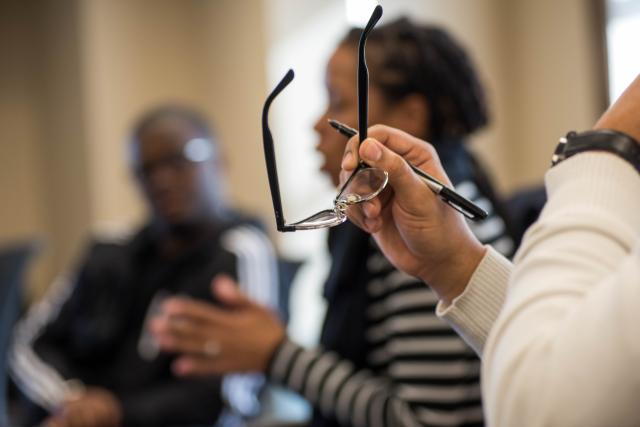
Helpful Guidelines
We offer the basic guidelines below for creating a brave space for authentic conversation where participants can learn from one another. These can be adapted to a workplace, a classroom, or a personal conversation with family and friends.
Establish agreements that encourage mutual respect and deep listening.
- To create a brave space of authentic dialogue set intentions such as: What is said here stays here, what is learned here leaves here.
- Don't attribute statements to individuals or share the stories of others; Do take your learning from the conversation and share with those in your sphere of influence.
- Listen to understand, stay present; do not listen to respond.
- Do not interrupt.
- Assume good intentions, but also…
- Accept your impact – mistakes will be made; take responsibility for the impact of your words and apologize if someone expresses hurt.
Communicate the purpose of listening and learning from each other.
- When you intentionally sit down to dialogue, remember that you are becoming a willing participant to share experiences and learn about others.
Acknowledge discomfort and uncertainty.
- Acknowledge these conversations may be difficult and uncomfortable, especially for those who have privilege.
- For those of you who have not participated in any diversity, equity and inclusion trainings or workshops or are feeling unprepared, provide additional guidance and support, such as a pre-reading.
Recognize different and acknowledge unequal treatment.
- For conversations about race, the goal is not to be “colorblind”.
- Stating that one is colorblind is not acknowledging the differences of others.
- Be clear that conversations are about recognition and understanding of lived experiences of inequality.
Continue to learn.
- Ongoing learning is necessary.
- Take personal responsibility to learn more.
- Seek out diversity education for yourself and your colleagues or fellow students.
- Learn about privilege; Consider Implicit Bias Association Tests as self- reflective activities.
Review this list of Do’s and Don’ts
DO have a discussion with your team, colleagues, and other students about the issues. DON'T expect people of with minoritized identities to shoulder the burden of teaching others about their privilege or oppressive actions.
DO listen carefully and actively. Listen to understand. DON'T listen to respond with excuses or explanations. Do not dismiss experiences. Do not gaslight.
DO expect discomfort and uncertainty. DON'T become overly defensive, especially if your views or advantages are questioned or challenged.
DO share how you feel and provide your own reflections. Use “I” statements when responding to stay with own thoughts and feelings. DON'T share the stories of others once you leave this space.
DO expect good intentions along with mistakes. Call folks in for dialogue about the impact of their words. DON'T make accusations, shame, or belittle. This will only shut down sharing and learning.
DO own your impact. DON'T ignore hurt.
DO have open conversations that allow for vulnerable exchanges. DON'T allow harm or disrespect. You may need to end conversations that cross a line to harassment or hate.
DO establish strategies for quieter participants, but also make it ok to just listen. DON'T single out people to speak
Dialogue is the first step. Commit to learning and action. Do not stop here.
What to do if participants bring forward harassment or discrimination experiences
We recognize that participants may bring forward experiences with harassment or discrimination.
The university's Office of Institutional Equity (OIE) was created to coordinate the university's response to all complaints of harassment, discrimination, and sexual misconduct. To learn more about your rights to be free from harassment and discrimination, to get assistance connecting with support resources, or to file a report, please contact OIE at:
- Online – report form at equity.osu.edu
- Call – 614-247-5838
- Email – equity@osu.edu
- An anonymous concern may also be reported through EthicsPoint
